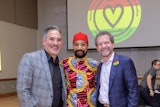SELMA — Omari Ho-Sang has spent this past week marching along the busy Route 80 corridor in Alabama.
While many of her fellow classmates are spending their spring break in the Caribbean, Ho-Sang is taking the 54-mile trek from Selma to Montgomery.
The 21-year-old Tuskegee University student is among dozens of college students who traveled to Alabama this week to participate in the annual commemoration of the “Bloody Sunday” organized by the National Action Network and other civil rights and labor groups.
The original 1965 march, which happened long before these college students were born, ended in a violent showdown between protestors and police on the historic Edmund Pettus Bridge Undeterred, activists including Dr. Martin Luther King and John Lewis, now a U.S. Representative from Georgia, successfully led two separate marches that marked the political and emotional peak of the civil rights movement and led to the passage of the Voting Rights Act later that year.
But this year’s commemoration has attracted national attention for its sharp criticism of Alabama’s voter ID laws and anti-immigration legislation, which activists say is discriminatory. The immigration law, enacted last year, requires police to determine citizenship status during routine traffic stops. It also requires government offices to verify legal residency for everyday transactions such as obtaining license tags for a car, enrolling a child in school, getting a job or renewing a business license.
“We’re not being beaten on the bridge, but we’re being blocked at the ballot box,” says the Rev. Al Sharpton, president of the National Action Network and a host on MSNBC. “The march is done in the same spirit, it’s the same issues,” says Sharpton, adding that the voter ID law is “a solution looking for a problem.”
For Ho-Sang, a psychology major from Birmingham, Ala., the experience has been awe-inspiring. In high school, Ho-Sang says that she was never taught much about the civil rights movement, adding that her introduction to the history of the movement occurred just a few years ago when she arrived at Tuskegee.
The march, “has been very introspective, and I’ve been able to put a lot of things in perspective,” she says.” We’ve marched and slept with veterans so I’m learning how movements like this progress.”
She and fellow Tuskegee student leader Lindsey Lunsford, 21, of Columbus, Ind., have received a rare history lesson in the civil rights movement from veteran activists, many of whom participated in the original 1965 march.
For the past few days, they’ve walked alongside these activists and have quizzed Sharpton and the Rev. Jesse Jackson along their journey about their experience growing up fighting for social justice in a different era. They even shared sleeping quarters at a communal campsite where NAACP President Benjamin Jealous decided to stay.
“It feels like a lifetime that we’ve been marching, but I’ve come through so many realizations and epiphanies,” says Lunsford, a political science major who will rally on Friday at the State Capitol with thousands of others.
Though the week has been transformative, Ho-Sang and Lunsford say that they wished even more college students would have decided to participate in the event.
“We need to step up,” says Ho-Sang, who has been active in student movement on her campus and hopes to bring some of the older activists she’s met during the week to Tuskegee to speak to a younger generation.
“I’ll be more assured in my activism,” says Lunsford. “I’m going to tell everybody about this when I go back to school. We all have to step up to the cause.”















